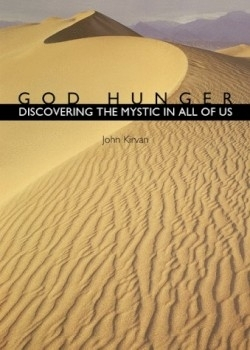God Hunger
Discovering the Mystic in All of Us
This is not spiritual junk food, Kirvan tells readers on page one. Instead, he says, this is a deeper feast, an attempt to sate twentieth century spiritual emptiness with mystic meditations on God.
Kirvan theorizes that modern society, though embarrassed to admit it, hungers for God. It’s a primal longing not for morality or religion, but for a soul-deep sense of connection to a higher power. God Hunger attempts to answer that primal longing. It attempts to search for God through the writings of nine mystic thinkers and the Kabbalah, crossing religious lines to touch on Christian, Jewish and Islamic traditions.
The mystic messages are broken into fifty “experiences for the soul”—a short quote from the mystic, ruminations on the quote from Kirvan and a prayer. In one chapter, fourth century writer Gregory of Nyssa asks: “How can that which is invisible reveal itself in the night?” Kirvan follows with a short sermon on the journey into divine mystery, explaining that people must surrender to darkness to see what it holds.
Chapters explore longing, dying, passion and resurrection, among other topics, and include short biographies of the writers, who range from thirteenth century Persian poet Rumi to this century’s theologian and author C.S. Lewis.
Kirvan, who was chaplain at Detroit’s Wayne State University in the 1960s, is author of Thirty Days with a Great Spiritual Teacher, a fourteen-book series of daily meditations on the wisdom of the mystics.
God Hunger isn’t spiritual junk food. But its deep thoughts are packaged into snack-sized portions, which may be sufficient to satisfy divine cravings.
Reviewed by
Lori Hall Steele
Disclosure: This article is not an endorsement, but a review. The publisher of this book provided free copies of the book to have their book reviewed by a professional reviewer. No fee was paid by the publisher for this review. Foreword Reviews only recommends books that we love. Foreword Magazine, Inc. is disclosing this in accordance with the Federal Trade Commission’s 16 CFR, Part 255.

